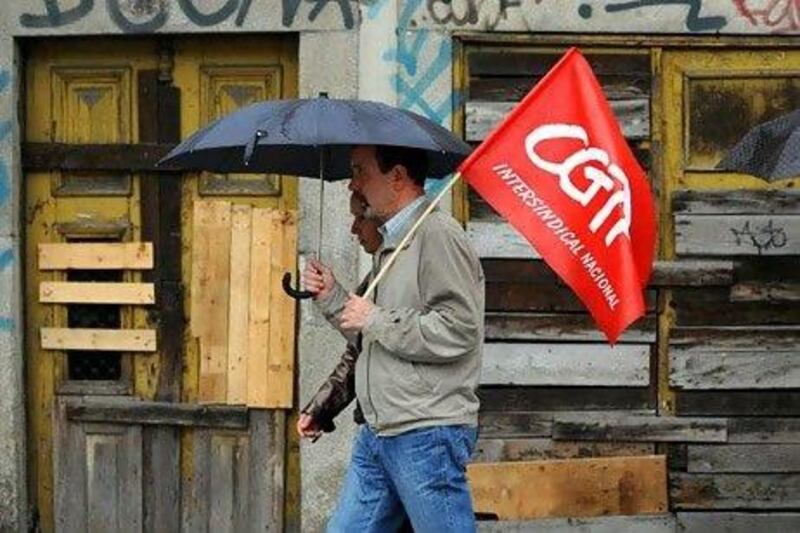AMSTERDAM // The decision to rescue Spain's battered banking sector is likely to trigger a wave of protests from Greece, Ireland and Portugal after they received multibillion-euro bailouts in the past two years.
Unlike the unlucky three, Madrid has managed to get a deal that looks far better on paper than agreements thrashed out in Athens, Dublin and Lisbon, where the buzzwords were austerity, austerity and austerity.
Hardly surprising then, that Greece, Ireland and Portugal are now looking at the Spanish deal as a possible way out of the tough conditions that were imposed on them in exchange for the billions of euros in aid.
First up, next Sunday, is Greece where a second election may determine whether the country will stay in the euro, an uncertainty that is affecting the whole economic and political landscape in Europe as well as the United States and Asia.
In the US, commentators are now saying that Barack Obama's presidential re-election may hinge on Europe's economic fortunes.
Already Europe's relatively generous conditions for Spain are likely to play a last-minute role in the Greek vote. The deal will also cause unease in Ireland and Portugal, which are chafing under much tougher conditions imposed by the European Union and the IMF.
Ireland, which like Spain also had to be bailed out because of its banking sector in 2010, was reported to be seeking to renegotiate its terms. But the Irish finance minister Michael Noonan cautioned that Spain's deal was not as good as many were assuming, even though Madrid will not have to impose additional austerity measures, for now.
"Similar to existing programmes of assistance, the European funds provided to Spain will be the responsibility of the Spanish sovereign," said Mr Noonan, implying that Ireland's €85 billion (Dh390bn) bailout was not much different.
So far, Spain has been desperate to distance itself from the league of European losers.
The country's prime minister Mariano Rajoy stuck to calling the rescue package merely a "line of credit" of up to €100bn from the EU's emergency funds. In explaining Madrid's U-turn in seeking the European funds, he said the decision had boosted the "credibility" of the euro.
But the deal had all the hallmarks of previous European stopgap measures to address problems in individual countries while postponing action on a more sustainable solution to the continent's financial and economic woes.
In each previous case, attention quickly shifted from one rescued vulnerable country to the next. Contagion was everywhere.
The problems of finding a longer-term solution, such as closer fiscal and even political union were illustrated last week in the Netherlands, where the prime minister Mark Rutte is facing elections in September after his coalition fell due to EU-mandated budget cuts.
"On some issues we want more Europe, like the internal market, but on many others we want less Europe," said Mr Rutte, who is facing a stiff challenge from euro-sceptic parties.
As the crisis continues, Spain itself may remain the target for market concern as many analysts pointed out that the deal would increase the country's debt burden.
Italy, too, is seen as being in danger of needing emergency aid because of a shrinking economy and its large sovereign debt.
Mario Monti, the country's prime minister, was aware of that ahead of Spain's bank bailout and urged stronger European action last week.
"There is a permanent risk of contagion, contagion from Greece, from other countries. That is why strengthening the euro zone is of such collective interest," he said at a conference in Venice on Italian-US relations.
The impact of the euro crisis is being felt ever further afield as both the Chinese and the US economies are showing signs of being held back by Europe's economic woes.
Last week, Mr Obama urged Europe's leaders to come up with "an immediate plan" to confront the euro's problems.
At the weekend, commentators started to pick up on the economic ripple effect of Europe's crisis on the US elections.
A Washington Post piece concluded: "Unfortunately for [Mr] Obama, there's no sign here that Europeans will come to grips with their problems before November."
And that is the problem in a nutshell.
twitter: Follow and share our breaking business news. Follow us
iPad users can follow our twitterfeed via Flipboard - just search for Ind_Insights on the app.





